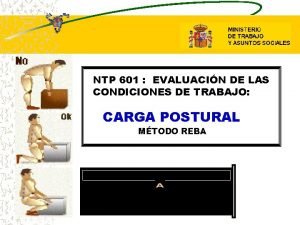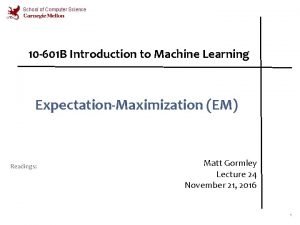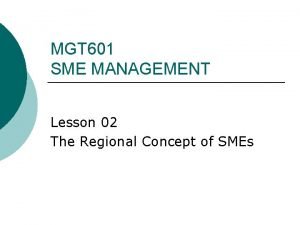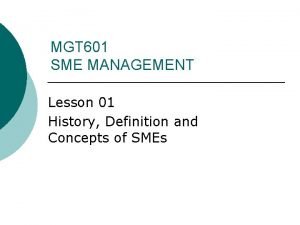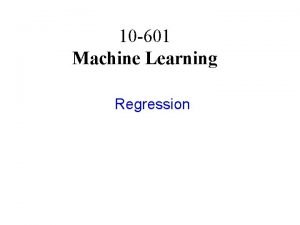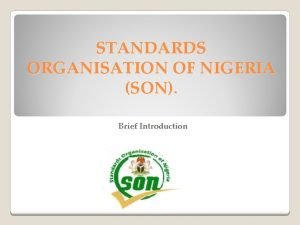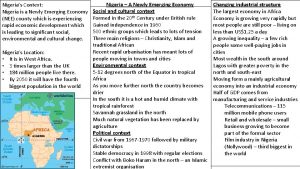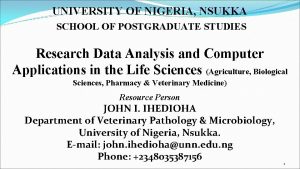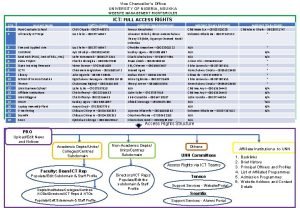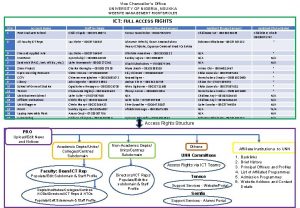PGC 601 UNIVERSITY OF NIGERIA NSUKKA SCHOOL OF






























- Slides: 30

PGC 601 UNIVERSITY OF NIGERIA, NSUKKA SCHOOL OF POSTGRADUATE STUDIES ICT AND PRINCIPLES OF DATA ANALYSIS PROF. UZOMA ODERA OKOYE Department of Social Work University of Nigeria, Nsukka uzoma. okoye@unn. edu. ng 08054123682

OUTLINE Ø Ø Ø Ø Ø GOALS AND OBJECTIVES QUANTITATIVE AND QUALITATIVE INTRODUCTION TYPES OF DATA COLLECTION DATA QUALITIES OF A GOOD QUESTIONNAIRE ORDERING OF QUESTIONS IN THE QUESTIONNAIRE WORDING OF QUESTIONS IN THE QUESTIONNAIRE POPULAR ANALYTICAL PACKAGES ADVANTAGES OF USING DATA ANALYSIS SOFTWARE SPSS AS AN ANALYTICAL TOOL PGC 601

GOALS AND OBJECTIVES The objectives of this lecture as follows: ØTo create a general awareness about ICT in data analysis ØThe re-emphasise the importance of questionnaire as a data collection tool ØTo expose students to the use of SPSS in data analysis ØTo empower students to ask pointed questions to “SPSS” experts and crosscheck what was done. PGC 601

INTRODUCTION �To have a good data to analyze you must first of all collect quality data �In order to collect quality data, you must have a good instrument �Data collected can be in qualitative or quantitative form PGC 601

QUALITATIVE DATA �QUALITATIVE DATA is a categorical measurement expressed not in terms of numbers, but rather by means of a natural language description �Sometimes qualitative data can provide descriptive information that may corroborate some of the findings from the quantitative method �Provide insights and a greater depth of meaning and understanding of findings. �Provide the needed tools for prompts, probes and the observation of certain nuances that underlie some of the sensitive and personal issues to be studied. �Examples of qualitative instrument include interview guide PGC 601

QUANTITATIVE DATA �Quantitative research deals with measurable and quantifiable aspects of phenomenon under study. It focuses on the questions to what extent? By how much? What relationship exists between factors? What causes particular processes or situations? Quantitative research is concerned with the collection and analysis of data in numeric form �Quantitative data can be used to determine the size, distribution, and association of certain variables in a study population. “How many? ” “How often? ” and “How significant? ” are important questions requiring fairly simple statistical techniques. Questionnaire is a typical example. PGC 601

Qualities of a good questionnaire �Every questionnaire must have a covering letter that will tell your respondents who you are and the purpose of the questionnaire �The questionnaire should be divided into section �Each section must have general and specific guidelines to respondents �Remember the data will be coded so put the coding into consideration when developing the questionnaire PGC 601

EXAMPLE �Which of the following do you think is the one best way to stop the spread of HIV/AIDS 1. 2. 3. 4. Early marriage ( ) Prayers and fasting ( ) Having only one sex partner ( Use of condoms ( ) ) THIS QUESTION WAS DESIGNED WITH CODING IN MIND PGC 601

Ordering of questions in the questionnaire � Do not ask sensitive questions first. � Eg Age should not be the first question. � Arrange the questions in content areas � Embarrassing questions should come last PGC 601

Wording of questions in the questionnaire �You must make the questions to be simple �The questions should be short. �Avoid the use of scientific abbreviations, jargon and slang unless you are using a specialized population as your respondents. �Avoid leading questions. PGC 601

Wording of questions in the questionnaire (2) �Avoid ambiguous questions. �Avoid emotional language and prestige bias. �Avoid asking questions that are beyond the capabilities of respondents. �Know when to ask direct and indirect questions �In using close ended, make sure that there response categories are exhaustive and also mutually exclusive �Avoid double barrel questions. PGC 601

WHAT IS DATA ANALYSIS? �Data analysis is the process of extracting information from data. It involves multiple stages including establishing a data set, preparing the data for processing, applying various statistical tools, identifying key findings and creating reports �There a variety of specific data analysis method, some of which include descriptive, inferential, predictive, casual etc PGC 601

POPULAR ANALYTICAL PACKAGES � Statistical Package for Social Sciences (SPSS), �Epidemiological Information (Epi Info), � Microsoft Excel � STATA �SAS PGC 601

ADVANTAGES OF USING DATA ANALYSIS SOFTWARE � Reduce/eliminate errors in calculation � Data management, e. g. , add variables & observations, recode variables, etc. � Graphical utilities �Multiple users can work with the same data file �Faster, more efficient PGC 601

Generic Features of SPSS � “Raw” data are organized in tabular format with each observation having a row and each variable its own column (i. e. , observation by attribute) �Data, command, & output files are distinct and saved as such �Menu or syntax can be used to create graphical displays �Variables have to be identified in a certain format prior to analysis (most likely “numeric, ” not “string”) �Extensive “help” menus PGC 601

USING SPSS TO ANALYZE YOUR DATA �The first thing to do is to number your questionnaire serially �Why? • For quality control and to make corrections easier § The next thing to do is to develop value labels PGC 601

SPSS VARIABLE PAGE PGC 601

Example of a Questionnaire Instruction: Please carefully read the questions below and provide a response to each question by ticking (√) to your chosen option(s) from the alternatives provided. Where there are no options, you are free to indicate other responses as it applies to you. Section A: Socio-Demographic Information 1. Sex: (1) Male [ ] (2) Female [ ] � 2. How old were you during your last birthday? ______________ � 3. Marital status: (1) Single [ ], (2) Married [ ], (3) Separated [ ], (4) Divorced [ ] (5) Widowed [ ]. � 4. Occupation: (1) Farmer [ ], (2) Trader [ ], (3) Artisan [ ], (4) Civil Servant [ ] (5) Student [ ], (6) Unemployed [ ], (7) Others specify _______ � 5. Educational Status: (1) No formal education [ ], (2) Primary education completed [ ], (3) Primary education non-completed [ ], (4) Secondary education completed[ ] (5) Secondary education noncompleted [ ], (6) Tertiary education completed[ ], (7) Tertiary education non-completed [ ], (8) Don’t know/No answer [ ] � 6. Religion: (1) Catholic [ ], (2) Protestants [ ], (3) Pentecostal [ ], (4) Islam [ ], (5) African Traditional Religion [ ], (6) Others specify __________ PGC 601

Example of Questionnaire (2) Section B: Issues on the knowledge of planning for what will happen after one’s death and existence of its elements. � 9. Have you heard of people making arrangement of what will happen after they die? (1) Yes [ ], (2) No [ ], (3) Don’t know/No answer [ ]. 10. Which of the following would best describe how to make arrangement of what will happen after one’s death? (1) Communicating the location of one’s assets/property to the family members when healthy [ ] (2) Communicating one’s treatment preferences and choice of burial plan to the family members when healthy [ ]. (3) Informing one’s family members about financial engagements [ ] (4) Communicating issues about one’s family’s histogram and communal intra/inter marriage to the family members [ ] (5) Transferring knowledge about the use of herbs to one’s family members if there is any? [ ], (6) Others specify _______________________ (7) Don’t know/No answer [ ]. 11. What do you think making arrangement about what will happen after one’s death should entail? (1) Writing a will [ ], (2) An arrangement to transfer properties to one’s beneficiaries [ ], (3) Discussions with one’s family members on choice of burial plans [ ], (4) All of the above [ ], PGC 601

EXAMPLE OF A VALUE LABEL WINDOW PGC 601

ANOTHER EXAMPLE PGC 601

AN EXAMPLE OF VALUE LABELS PGC 601

AN SPSS DATA PAGE PGC 601

COMPLETED SPSS DATA PAGE PGC 601

HOW TO OBTAIN FREQUENCY DISTRIBUTION TABLES PGC 601

HOW TO OBTAIN FREQUENCY DISTRIBUTION TABLES CONTD PGC 601

SAMPLE OF SPSS OUTPUT PGC 601

REDRAWING SPSS OUTPUT IN WORD PGC 601

RE-CODING AND RE-ORANIZING AGE DATA PGC 601

THANK YOU FOR LISTENING PGC 601
 Pgc 601
Pgc 601 Pgc 601
Pgc 601 Pgc 601
Pgc 601 Pgc world
Pgc world Pgc 2000
Pgc 2000 Jaynell pittman
Jaynell pittman Ek601
Ek601 Ntp 601
Ntp 601 Mgt 601
Mgt 601 Http 601
Http 601 Nr 601 week 2 quiz
Nr 601 week 2 quiz Backpropagation logistic regression
Backpropagation logistic regression 601(b)(10)
601(b)(10) Sme management definition
Sme management definition 601 pro
601 pro Peugeot 601 eclipse
Peugeot 601 eclipse Itcp in mobile computing
Itcp in mobile computing Hino 601
Hino 601 601(b)(10)
601(b)(10) Italian sports club werribee
Italian sports club werribee Sme management definition
Sme management definition 10-601 machine learning
10-601 machine learning Standards organisation of nigeria
Standards organisation of nigeria Laws guiding book publishing in nigeria
Laws guiding book publishing in nigeria Nigeria newly emerging economy
Nigeria newly emerging economy Universities that offer pharmacy in nigeria
Universities that offer pharmacy in nigeria Kasim balarabe
Kasim balarabe Environmental policy in nigeria
Environmental policy in nigeria Gifmis manual
Gifmis manual Benin xxxvideo
Benin xxxvideo History in community
History in community







